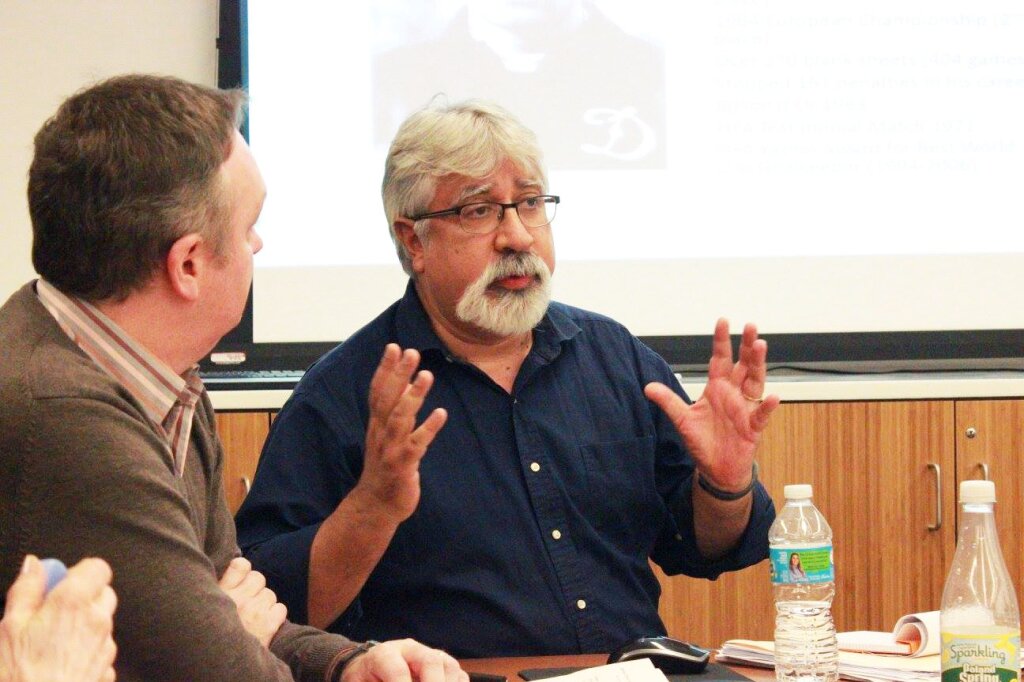Marco Biasioli is a Lecturer in Russian and East European Studies at the University of Manchester, UK. His interests include Soviet and Russian popular music, culture-power interactions, literature and national identity.
“I can get an idea of what Russia sounds like today only from second-hand data—or from my colleagues’ articles,” wrote music journalist Aleksandr Gorbachëv in 2023. “Those who left, like me, write and talk only about the war. Those who remain write and talk about everything except the war.” With these words, Gorbachëv began his take on the transformations in the Russian music industry after 2022. As practitioners left Russia in droves, the necessity to rethink the scene confronted a lack of unifying criteria for understanding it. One year after Gorbachëv’s piece, which already presented a split picture, the world of Russian music has only grown more fragmented.
Russia’s full-scale invasion of Ukraine catalyzed an unprecedented wave of emigration among Russian music practitioners. The newspaper Kommersant, for example, estimates that 30% of Russian artists abandoned their country or ceased creative activity in 2022. The Russian Ministry of Justice declared some of Russia’s most renowned musicians “foreign agents,” another unprecedented occurrence. As a result, two cultural Russias have emerged. Despite the occasional skirmishes around who has the moral high ground—those who stayed to deal with the authoritarian regime, or those who emigrated in protest—these “two Russias” are not necessarily opposed to each other. What is true is that they are losing sight of—and connection with—one another. For those who stayed, it is difficult to be aware of the enormous amount of activity, and the networks of solidarity, that have taken shape in the context of emigration. For those who left, it is equally hard to know of the vast musical life that bubbles beneath the surface of pop stars loyal to the regime.
But is this division so clear-cut? On both sides of the geographical divide, performers have dealt with similar questions of identity, heightened by the war and interacting with the changing milieu: is there a Russia at all, culturally? If so, which Russia are we talking about? Which one better represents today’s situation? The answers, as they manifest in musical form, are extremely fractured. Distinguishing different forms of expression is not genre, but varying perspectives on Russia. In turn, these perspectives intertwine with performers’ professional self-interest as well as ethical and aesthetic considerations.
For example, among the musicians who left, there are those who prioritize the articulation of clear political protest in their music; those who don’t see this type of articulation as aesthetically valuable; those who prefer to address fellow members of the diaspora; and those who want to address audiences within Russia as well. Among the musicians who remained, there are those who explicitly support the government; those who are silent; those who articulate political protest for those “in the know” (dlia svoikh); those who don’t want to leave because they can’t see themselves having a career abroad; and those who can’t leave for logistical reasons. These are only some of the variables at play, and they can intersect in multiple ways and change over time. In what follows, I will try to pin down only some of these musical manifestations.
Let’s start with the most morally dubious phenomenon, so-called ‘“Z-music.” This term denotes patriotic music, or composers, that support the invasion of Ukraine. “Z-music” has received copious state funding since February 2022, but domestic demand for it remains low. Of course, there is Shaman, the author of the nationalistic anthem “I'm Russian” (Ya russkii), who enjoys red-carpet treatment from the authorities, who have attempted to elevate him to a charismatic figure of national importance. But this attempt to cultivate culture from the top has failed, at least so far: not only is the singer’s success limited in proportion to the government’s investment, but also, his output is met with indifference or even resistance. In the Sverdlovsk region, for example, a recent gig was cancelled due to (in all likelihood) poor ticket sales; in the southern Russian city of Stavropol’, due to public disapproval. In a survey conducted by the state polling center, VTsIOM, Shaman topped the league of most patriotic Russian singers, but also of the most shameful. As Gorbachëv has pointed out, even among Shaman’s true fans, his most popular songs are the ones about love for another person, not for the country.
As journalist Yury Saprykin has observed, Russian patriotism, in music and beyond, usually involves a considerable dose of irony. The reader, viewer, or listener is generally unsure whether the author is joking, celebrating, or both. If patriotism is performed fully seriously—as is the case with Shaman—it becomes strongly associated with the state and, therefore, unappealing, all the more so today, when the state is waging destruction on its neighbor. In general, Russian musicians and artists—even those who make their country a primary focus—have tried to distance themselves from the state and its institutions.
But if taking the irony out of a patriotic song turns it into uninteresting propaganda, does removing all obliqueness from protest music make it equally predictable? A mixture of sincerity and irony, a sort of political suspense, was one technique musicians and other artists have used to comment on growing authoritarianism while evading censorship. We may call this blend of contestation of the status quo with affective attachment to the country patrioprotest. By deploying this tactic, musicians like the pop sensation Monetochka (Liza Gyrdymova), the art-post-punk band Shortparis, and Russia’s 2021 Eurovision entry, Manizha, achieved nationwide success among audiences and critics in disparate political camps, from readers of Meduza to viewers of Channel 1, Russia’s main propaganda network. But the moral imperatives of the war, the main one being to declare whether one is “for” or “against,” have in many cases dissipated carefully crafted enigmatic stances. Manizha and Monetochka, for example, left Russia. Shortparis remained dlia svoikh, producing music whose poetic prowess conceals political references, but at the cost of receding, willingly or not, into a smaller niche.
Among those who left, after an initial surge in song-statements against the war, explicitly political lyrics have declined. Recently, though, the trend has been revived by the rap collective Kasta. Their latest album, Novelties of Foreign Rap (Novinki zarubezhnogo repa), which came out this September, fiercely attacks Putin’s Russia and sounds like an instruction manual for the Russian oppositional migrant. As a result, the main Russian streaming service, Yandex Music, has blocked the album at the request of state media watchdog Roskomnadzor. Novinki bleakly and unceremoniously summarizes all the themes common in migrant music circles: war, loss, death, rage against domestic institutions, and disillusionment about the future in Russia.
Almost simultaneously with Kasta’s album, Afisha’s celebrated Picnic Festival resumed in Russia. A lifestyle, fashion and entertainment webzine (formerly magazine) active since 1999, Afisha in the 2000s contributed to westernizing the taste of the urban and middle-class Russian youth by imagining, and shaping, Moscow as interconnected with other European capitals (the very idea of which Putin has now dismantled). The Picnic Festival, one of Afisha’s chief manifestations, consolidated the image of Russia as part of a global village by bringing Western musicians like the Cure, Arcade Fire, Kasabian, or Foals to perform there, all while showcasing local acts in similar styles.
When the festival returned after a 4-year hiatus in August 2024, its ethos was quite different. Given the circumstances, Picnic didn’t strive to project an international image, but instead looked inward: this time, the musicians were (almost) all Russian. At the same time, the event’s organizers tried to avoid direct references to politics. The festival presented, at least on the surface, a reality that did not—and because of state censorship, could not—acknowledge the war at all.
Russian music “has cocooned,” concludes music critic Nikolai Ovchinnikov, referring to musical production on either side of the divide. Within Russia, he says, festivals are headlined by the same small group of artists, who cannot voice their own civic position. Outside Russia, he continues, music has become “journalism,” with the voicing of dissent taking priority over producing interesting songs. The critic laments the absence of a middle ground. Thus, specific questions about Russia as such blend with broader and recurrent cultural concerns: should art strive to be primarily aesthetic, or political? Should it promote escapism or active resistance? Ovchinnikov suggests that this is a false binary: an artless protest may fall on deaf ears, while art for art’s sake, in the context of war and destruction, may look out of place. At the same time, the opposite may also be true: escapism can be a move of utmost resistance that turns the collective gaze elsewhere and, by imagining a different reality, helps bring it into being. Conversely, even the plainest protest songs can succeed in doing exactly the same thing.
A further complication in this picture of those who stayed (ostavshiesia) and those who left (uekhavshie) is their own mental (re)construction of their country, culture, and society. According to sociologist Aleksei Titkov, geography here plays a secondary role—the most important question is whether participants see Russia “from without” or “from within.” Is Russia what we see in Western or domestic media? How representative are images of, say, militarized schools, parades, and totalitarian kitsch? Do Russians identify with Putin? Conversely, how widespread or effective is the quiet, private resistance of the Russians who remained? The answers to these questions, Titkov explains, involve classifications, coordinates that individuals use to make sense of what they see. “Leavers” tend to perceive Russia in “big chunks,” to label it in all-encompassing, usually negative terms, and to place themselves emotionally outside of it. “Remainers,” on the other hand, apply negative (or positive) markers more selectively and from inside the picture they are describing. In this way, a person can be physically abroad but perceive Russia through the eyes of someone who remained, and vice versa.
This framing helps explain the different approaches self-exiled musicians have taken, regardless of genre. Kasta, for example, are uekhavshie, performers who seem to have closed the Russian chapter of their lives forever. Another such example is the rapper Face (Ivan Drëmin), whose decision to delete his catalog from Russian streaming platforms signalled a rupture with his erstwhile homeland. Monetochka, by contrast, though physically abroad, is in her cultural production close to the ostavshiesia. Her latest track, “It Happened in Russia” (Eto bylo v Rossii) follows a melancholic line that, while acknowledging the impossibility of return, holds a personalized, positive version of the country alive in memory: “It was in Russia, so it was a long time ago / It was in Russia, so it was in a dream / I can’t steal a dream, it’ll stay with me.” A similar path has been taken by another musician who, like Monetochka and Face, has been declared a “foreign agent”: Noize MC (Ivan Alekseev). In his latest song, “Bright Path” (Svetlaia Polosa), Alekseev leaves behind his characteristic criticism of Russian political institutions, instead creating a hymn to hope in even the darkest times: “And I say—we’ll get there in spite of everything / There are lights ahead / They just can't be seen yet”.
In the end, however, Russia’s charts are topped by music about love, relationships, and everyday problems. These songs tend to efface considerations of Russia and its politics, in the sense of the individual’s relation to state,its institutions and actions. If this is the music that “Russians” are listening to now, does it mean they do not care about what their political elites are doing? Maybe. But carefree (or careless?) pop music has almost always topped the charts, not just in Russia but everywhere else. If we look at Western countries, for example, we see the same type of music, sonically and in terms of lyrics. Per Edward Bernays, a nephew of Sigmund Freud and the founder of the field of public relations, people will always need entertainment, no matter the political situation. It is in our human nature to want to be distracted—and distraction need not be synonymous with complicity. By the same token, however, it is in the nature of the state to rely on distraction to manage popular discontent.
The author thanks Aleksei Titkov for his insightful comments.



